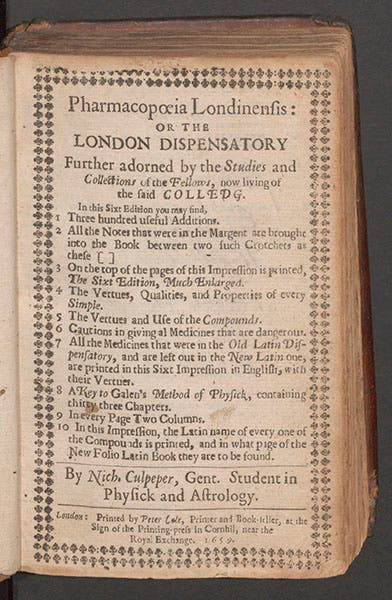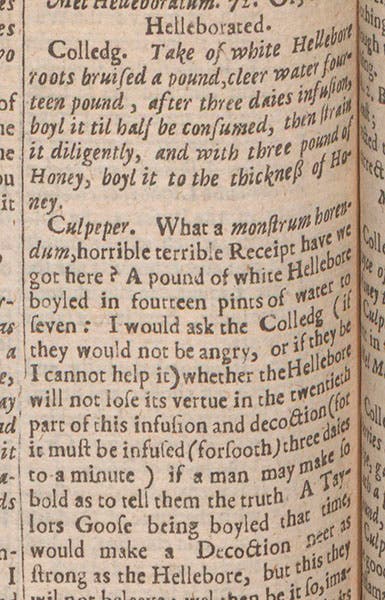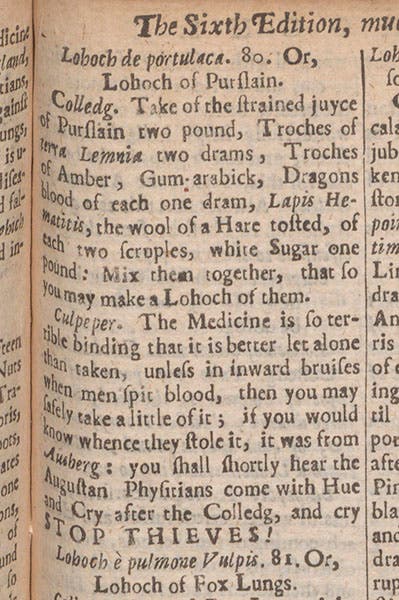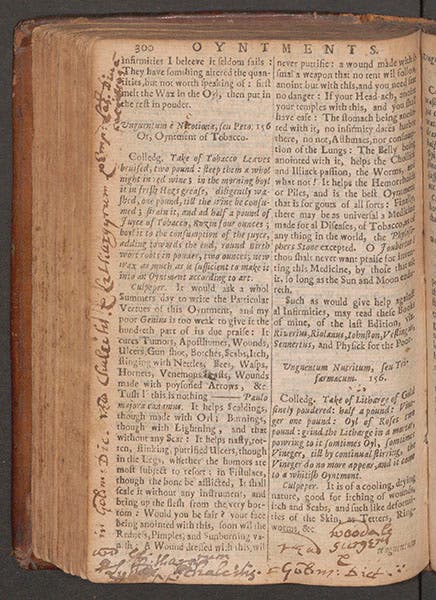Scientist of the Day - Nicholas Culpeper
Nicholas Culpeper, an English apothecary and herbalist, was born Oct. 18, 1616. In 1618, the Royal College of Physicians of London had issued the first Pharmacopoeia Londinensis, an official guide to apothecaries for preparing pharmaceutical remedies. It was written in Latin, so only the learned could read it, and it carefully omitted how the medicines were to be used – that was the province of the physician. Culpeper was a rebel from the outset, in politics, in religion, and in medicine, and he hated the stranglehold that the College had on the practice of medicine in London. So in 1649, Culpeper produced an unauthorized translation of the Pharmacopoeia into English, which he published as The Physical Directory, outraging the medical establishment. Even worse, he revealed how each and every herb, oil, and syrup was to be used, including dosages. So now, anyone who could afford to buy the book could be his or her own doctor.

Title page of The London Dispensatory, 6th ed., 1659 (Linda Hall Library)
When the College countered by putting out a new Pharmacopoeia, still in Latin, in 1650 (the old one, in spite of being often reprinted, had not been updated since 1618), Culpeper translated and annotated that as well, publishing it as Pharmacopoeia Londinensis: Or the London Dispensatory further adorned (1653). Plus, he wrote a book for mid-wives, so they could cut their ties with male physicians as well, and a medical herbal, The English Physician (1652), better known in later printings as Culpeper’s Herbal. Poor Culpeper died in 1654, only 37 years old, of complications from a wound he suffered during the English civil war, for which apparently none of the remedies from The London Dispensatory were of any avail.

Entry on Helleborated Honey, a detail, from Nicholas Culpeper, The London Dispensatory, 1659 (Linda Hall Library)
We have a 6th edition of The London Dispensatory (1659) in the Library, and it is a delight to leaf through, since for each remedy, the author first conveys the conventional wisdom about it, in a paragraph labeled "College," and then adds his own views, often disagreeing with the preceding, in a paragraph labeled "Culpeper." We show here the chatty title page (second image), and selections from three entries: Helleborated Honey, Lohach of Purslain, and Oyntment of Tobacco.

Entry on Lohoch of Purslain, a detail, from Nicholas Culpeper, The London Dispensatory, 1659 (Linda Hall Library)
Culpeper begins his discussion of Helleborated Honey with the observation: “What a monstrum horendum, horrible terrible Receipt have we got here?”, and further on notes “the medicine would be so strong the Devil would not take it, unless it were powred down his throat with a horn (third image). He observes of Lohoch of Purslain, “This Medicine is so terrible binding that it is better let alone than taken,” and further points out that the recipe was stolen from the Augsburg Pharmacopeia without acknowledgement (fourth image).

Entry on Oyntment of Tobacco, from Nicholas Culpeper, The London Dispensatory, 1659 (Linda Hall Library)
We include the extract on oyntment of tobacco to show in what high esteem this plant was held in the 17th century, with Culpeper as enthusiastic as anyone. “It would ask a whole Summers day to write the Particular Vertues of this Oyntment, and my poor Genius is too weak to give it the hundreth part of its due praise.” In our copy, this is one of the few pages that has been annotated by an interested user (fifth image)
It is easy to see why Culpeper’s works were so popular, and why his editions of the London pharmacopeias greatly outsold the official and authorized versions for the next 250 years. It is perhaps no surprise that Culpeper’s Herbal is still in print, 360 years later.
Dr. William B. Ashworth, Jr., Consultant for the History of Science, Linda Hall Library and Associate Professor emeritus, Department of History, University of Missouri-Kansas City. Comments or corrections are welcome; please direct to ashworthw@umkc.edu.






